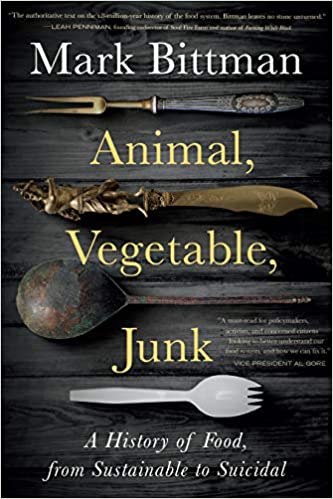Weekend reading: Bittman on food history
Mark Bittman. Animal, Vegetable, Junk: A History of Food, from Sustainable to Suicidal. Houghton Mifflin Harcourt, 2021.

This book comes with more than three pages of blurbs, starting with Al Gore and Leah Penniman and ending with José Andrés and Bryant Terry, so many and so glittery that I’m feeling a little left out that I wasn’t asked to do one.
I would have. It’s a good book. Bittman read a lot, is generous in citing sources (mine among them), and has done a thorough synthesis of the key events that transformed our food system from one that was healthy and sustainable (if hard on farmers) to today’s unsustainably industrialized system that is mainly set up to feed animals and fuel cars, and to encourage us to consume ultra-processed diets. We pay the externalized costs of this system in overweight and chronic diseases that increase our vulnerability to COVID-19 and in environmental degradation and climate change.
Here are a few excerpts:
And while Deere & Co. [the tractor company] showed good will toward struggling farmers, its success in financially bonding those farmers virtually ensured that creditors remained profitable in the long run. It’s also among the chief reasons why industrial agriculture is so difficult to change today. Today, the company’s margins are almost four times as great from providing credit as they are from sales…Its 2019 profits were eleven billion dollars, a bit more than ten percent of the comb8ined profits of all two million-plus farms in the United States that same year [pp. 107-108]
In fact, the worse you were treated by American policy in the eighteenth and nineteenth centuries, the worse you were treated in the twentieth. For example, the Social Security Act of 1935 and the Fair Labor Standards (sic!) Act of 1938 both excluded agricultural and domestic, thanks to influential southern Democrats who refused to protect the Black people working in those sectors. This meant that the New Deal disproportionately excluded people of color from the most vital government protections….[p. 120].
You will hear, “The food system is broken.” But the truth is that it works almost perfectly for Big Food. It also works well enough for about a third of the world’s people, who have the money to demand and have at a moment’s notice virtually any food in the world. But it doesn’t work well enough to nourish most of humanity, and it doesn’t work well enough to husband our resources so that it can endure, Indeed the system has created a public health crisis (one whose effects have, in turn, exacerbated the deadly effects of COVID-19), and, perhaps even more crucially, it’s a chief contributor to the foremost threat to our species: the climate crisis. The way we produce food threatens everyone, even the wealthiest and cleverest [p. 243].

